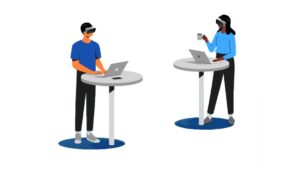Watch Out for These 6 Red Flags When Looking for Remote Jobs
While online job boards can help you find your dream remote job, they also play host to fraudulent entities who post illegitimate job listings. These listings defraud vulnerable developers looking for jobs.
To protect yourself from such job listing, we’ve listed the most common red flags that you should look out for when looking for jobs online.
Let’s dive in!
Remote software developer job red flags
-
Unprofessional remote job posts
One of the most obvious red flags for work-from-home positions is when the job description screams phony.
The job posting isn’t well written. They contain a lot of errors or are just very poorly punctuated. Here are a few aspects that can help you separate legit remote jobs from a rip-off:-
Grammatical issues
-
Spelling mistakes
-
Punctuation errors
-
Random capitalization
-
Wrong verb tenses
This isn’t just limited to the job posting, legit remote jobs imply professional recruiters who have the skills needed to do their job. So if they don’t seem professional or well-spoken when you talk to them, it is a sign of fraudulence.
-
-
The remote job is too good to be true
The second major red flag is when the job posting promises a crazy high salary but includes a vague job description.
If you feel like a job offer is too good to be true, that’s likely the case. When an ad promises good money, and incredible perks but the details about precisely what you’ll need to do to earn this money are unclear, simply move on to the next job listing.
Furthermore, legit remote jobs don’t offer the position lightly. So if the recruiter quickly offers you a brilliant job that you aren’t qualified for, it is another red flag.
Legit remote jobs include many details to ensure only the most qualified candidates apply for the role. These details include:- The job title
- Tasks that they expect the remote software developer to complete
- Skills and personality traits they are looking for
- A detailed introduction to the company
- Challenges they’re facing
- Sometimes, they also include official company email for correspondence
-
Emails from personal accounts
Hiring managers from reputed companies have email addresses that reflect the company they represent. Unless you’re sending an email to a virtual personal assistant’s ad, legit remote jobs should always have a company email address.It’s a huge red flag if you’re communicating with the recruiter by sharing your application to a personal email, or an ID with a long string of numbers.
Sure, they may use a reputed platform like Yahoo or Gmail, but even fraudulent entities can create new emails on these reputed platforms without much effort. They may cite excuses like:- Company servers are down
- They’ve been facing issues with viruses and spams
- The business isn’t established enough to provide official company emails yet
Furthermore, hiring managers usually have information about the company like the company address, contact details, and the website in the signature. If you don’t spot these details, there is a good chance the company doesn’t exist.
-
They ask you to share confidential information
Remote software developers should be skeptical about recruiters who ask for sensitive personal information before the onboarding process. Several job listings have the primary objective of obtaining personal information.
Don’t share your confidential information
Monetary theft, identity theft, and spoofing are the most common cybercrimes associated with fraudulent jobs. Remote developers should verify the organization and the hiring manager’s authenticity before sharing any sensitive data, and even then, they shouldn’t disclose any information until hired.
They may ask you to provide personal information to proceed to the next step in the recruitment process, maybe citing a background check or credit report as the reason.
Therefore, if someone asks for details like your credit card information, social security number, bank account information, driver’s license number, or others, simply move on to the next job post.
Furthermore, be vigilant about jobs that ask you to pay to work. -
There’s little information about the organization
Companies sharing legit remote jobs should have an official website and social media presence. Generally, businesses share links to their site and social media handles within the job listing. At the very least, they include the name of the organization.
If you fail to find an online footprint, it’s a red flag. -
Signs of email or website spoofing
Some fraudulent jobs go one step further, create dedicated websites, or impersonate a legitimate company with nearly similar email addresses.
A spooked website has a few telltale signs that you should take note of-
The website lacks standard branding
-
The job doesn’t ask for much-needed prerequisites
-
The website or email is very similar to the actual company but includes special characters like hyphens or even numbers
-
The website may have usual extensions instead of the standard .com, .net, etc.
-
The website is not secure. While this may not always be a big red flag, these websites can put your personal information at risk
-
However, not all remote jobs are fraudulent. If you find the right job, it can be the best decision for your professional career.
So, how do you find a good remote job?
The best way to find legit remote jobs is to use trustworthy job portals.
Turing matches remote software developers with authentic US-based enterprises.
Hundreds of companies, including multinational corporations like DELL, Coinbase, Pepsi, and more, use Turing to find remote software developers.
Turing provides remote job opportunities for developers to work with Silicon Valley-based firms with unparalleled compensation and long-term career growth.
Visit our Jobs page to know more!
Join a network of the world's best developers and get long-term remote software jobs with better compensation and career growth.











